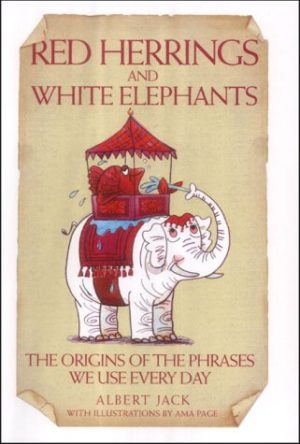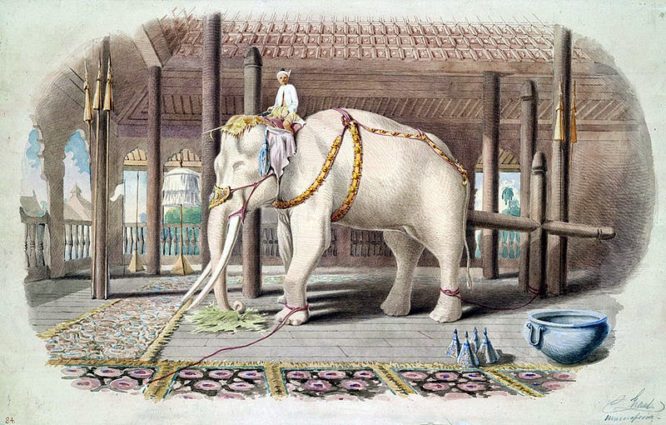A White Elephant is an expression used to describe something that has, or will, become a huge burden to those who possess it. It suggests the cost of possession could ruin a person financially.
For this we travel to Thailand, in the days when it was known as Siam.
According to the legend white elephants were so highly prized that whenever one was discovered it automatically belonged to the King.
It was considered a serious offence to neglect, put to work or even to ride a white elephant so in fact they were of no use to an owner anyway, yet still highly revered.
The King of Siam, it appears, was a wily old devil and recognising the special status given to the beast used them in ruthless fashion. He decided that any subject causing him displeasure would be given a white elephant as a special royal gift.
As a subject was obviously unable to refuse a royal gift it was immediately recognised as a great burden as the beast had a huge appetite and could not be made to ‘pay its way’.
White Elephants given as a royal gift would more often than not ruin a man financially and the cunning King had realised that.
The phrase arrived in England in the mid 18th century after the great Empire builders learned of the legend and brought it home with them, applying it to impress but otherwise useless public buildings or monuments.
To be Under The Weather means to feel unwell and unable to function properly.
Yet another nautical phrase with its origin far out at sea.
In days gone by when a sailor was genuinely ill he would be sent well below decks where he could recover without the wind and rain making his condition worse.
The raging sea could also make a man feel ill and yet under the decks and ‘under the weather’ his condition could begin to improve.
A Whipping Boy is a person who takes the punishment for a misdemeanour committed by somebody else.
Back in the Middle Ages it was quite common for a boy of ordinary, or even peasant, stock to be educated alongside a prince or the sons of the aristocracy. As a result the commoner benefited from great privileges and in some cases the position was sought after.
However, there was a down side. It was considered inappropriate for a schoolmaster or tutor to punish the product of the aristocracy and in the case of a Prince he simply would not dare.
Instead, when the toff misbehaved or failed in his studies, it would be the innocent commoner who received a thrashing in his place.
But there are well-recorded exceptions. When George Buchanan, who was the Latin master to James I, decided the boy needed punishing he thrashed the Prince himself, despite the presence whipping boy.
It didn’t end there as the brave Buchanan threatened to do it again if the misdemeanour was repeated.
The practice wasn’t confirmed to the schoolroom. When the French King Henry IV converted to Catholicism in 1593 he sent two ambassadors to the Pope who were symbolic whipped to atone for the King’s previous Protestantism.
They were both well rewarded and made cardinals soon afterwards.

To ask for something Warts And All is to have no attempt made to cover any defects or hide unsavoury detail.
Oliver Cromwell was a radical parliamentarian who overthrew the English Monarchy in the mid 17th century.
At the time portrait painters would soften the features of their subjects by removing blemishes and facial lines from their work (a sort of middle ages air brushing technique) and the end result would always be an improvement.
But as Lord Protector, when Cromwell commissioned Sir Peter Levy to paint his portrait, he issued the artist with the following instructions. ‘I desire you would use all your skill to paint my picture truly like I am and not flatter me at all. Remark all these roughness, pimples, warts and everything as you see me, otherwise I will never pay you a farthing for it’.
The end result apparently does include a large wart just below Cromwell’s lower lip.
To be On The Wagon is widely known to mean a person is teetotal and no longer drinking alcohol.
In the U.S water carts and wagons began carrying drinking water, or water for cleaning the streets, in 1700.
At that time a person who was known to have given up alcohol could often be found waiting for the water wagon to arrive so they could take a drink and quench their thirst.
People would flock around as the wagon arrived and reformed heavy drinkers were said to actually ride on the wagon around town so they could take on as much water as possible and help squash the craving for alcohol.
The expression became widely used in America throughout the 20th century.
When something has Gone To The Wall it is finished, over and can never be recovered.
This phrase apparently has a slightly morbid origin and actually relates to the practice of placing the dead next to the churchyard wall bordering the graveyard, prior to a funeral service.
But there are other suggestions for its use in our language.
Four hundred years ago the city streets were narrow, unlit and invited crime.
After dark innocent passers by were always at risk from thieves or muggers and a person cornered in a dark ally with their back to the wall really was vulnerable.
Another suggested origin comes from medieval chapel’s, such as the one found in Dover Castle, which provided stone seating around the walls to support the elderly and infirm.
The rest of the congregation were required to stand and the expression used at the time was that ‘the weak had gone to the wall’.
Take your pick from those.
– Albert Jack
Albert Jack AUDIOBOOKS available for download here

Money for Old Rope: The Big Book of Everything

